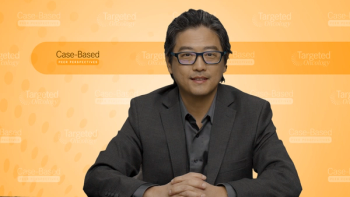
Researchers Seek the Optimal Dose of Venetoclax/Azacitidine/Obinutuzumab in FL
The study is currently recruiting in Chicago, Illinois.
A phase 1/2 dose-finding study (NCT04722601) of venetoclax (Venclexta), azacitidine (CC-496), and obinutuzumab (Gazyva) is currently underway in patients with minimally pretreated follicular lymphoma that have experienced disease progression despite trying previous cancer therapies.
“The main purpose of the study is to identify the safe doses of this triplet for use in patients with minimally pretreated follicular lymphoma. Once the optimal doses are identified, we have an expansion cohort to determine preliminary efficacy. The hope is that by targeting both BCL2 and epigenetic deregulation early in the disease course, we will have deep remissions that are long-lasting,” said principle investigator Sonali Smith, MD, the Elwood V. Jensen Professor in Medicine and the chief in the Section of Hematology/Oncology at University of Chicago Medicine in a statement to Targeted Oncology™.
The non-randomized, sequential assignment study has an estimated enrollment of 50 participants and an estimated study completion date of August 2024. The primary end points of the phase 1 dose-escalation portion are maximum tolerated dose of venetoclax and azacitidine as assessed by the rate of reported dose limiting toxicities, the number of participants who discontinue the regimen due to toxicities, and the number of serious grade 3/4 adverse events (AEs) reported by participants taking the triplet combination.
The primary end point of the phase 2 dose-expansion phase is the number complete responses as assessed by a whole-body scan. Secondary end points of phase 2 include the length of time that half of participants in the expansion group are alive after receiving phase 1 dose treatment at the end of the study and 5 years after the study is complete and the average length of time without symptoms of cancer worsening.
Phase 1 will be composed of 5 arms. In each arm, patients will receive a combination of each starting dose as used in previous human studies. Venetoclax 400 mg will be given on days 1-28, azacitidine 200 mg will be given on days 1-14, and obinutuzumab 1000 mg will be given on days 1, 8, and 15 of cycle 1, then on day 1 of each following cycle. Each cycle is 28 days long. Treatment will continue for 12 consecutive cycles. If participants do not experience severe negative AEs, dose escalation will continue in group 2 and 3. Group 4 and 5 are optional groups for patients who received lower doses of the triplet combination than set by investigators.
“This trial is for patient with follicular lymphoma that has either not previously been treated, or only treated with monoclonal antibodies. No prior radiation or chemotherapy,” said Smith.
In order to participate in the study, patients must be at least 18 years of age with a confirmed diagnosis of grade 1-3a follicular lymphoma by bone marrow biopsy within 90 days of initiating treatment, are treatment-naïve, have stage II-IV disease, an ECOG score of 2 or less, not be a candidate for standard of care chemotherapy, have adequate organ function, and must agree to use contraception. Patients may still participate if they have received fewer than 2 prior lines of anti-CD20 monotherapy consisting of a total of 16 or fewer doses.
Patients who have received prior systemic therapy other than anti-CD20 monoclonal antibodies, another malignancy that could interfere with the interpretation of study results, evidence of uncontrolled disease, known active bacterial, viral, fungal, or mycobacterial infection, clinically significant liver disease, malabsorption syndrome, or significantly active cardiac disease are not eligible to participate.
The study is currently recruiting at the University of Chicago Medical Center.
“The trial is open to accrual, and we hope to have more data soon,” Smith stated.



















